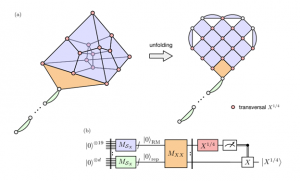Alice & Bob and Inria Improve Efficiency of Magic State Preparation to Enable Useful Quantum Computing
The ‘unfolded code,’ a new architecture that significantly reduces time and qubit requirements, sets foundation for universal quantum computing
Capitalizing on the cat qubits, this work further de-risks our roadmap while showcasing the long-term advantages of our universal platform.”
PARIS, FRANCE, August 6, 2025 /EINPresswire.com/ -- Scientists from Alice & Bob, a global leader in the race for fault-tolerant quantum computing, and Inria, France’s national institute for research in digital science and technology, have submitted a new study for peer review illustrating the most hardware-efficient method to date for producing magic states on superconducting quantum computers, a critical step toward realizing practical quantum computation.— Théau Peronnin, CEO of Alice & Bob
Preparing magic states has remained one of the most resource-intensive aspects of quantum computing. This work makes magic state preparation cheaper in terms of qubit requirements and considerably faster, consolidating the roadmap to the universal fault-tolerant gate set needed to run useful quantum applications at scale.
Their new approach, outlined in the paper “Unfolded distillation: very low-cost magic state preparation for biased-noise qubits” was recently posted on arXiv. The new code was inspired by existing methods and tailored to work with the company’s cat qubits, which inherently protect against bit flip errors in quantum computations (a ‘noise bias’).
To achieve universal quantum computation with the ability to run any possible quantum algorithm, including those with known speedups over classical ones like Shor's and Grover's algorithms, a quantum computer must support a complete set of specific fundamental operations or gates. While some gates can be directly implemented, others require the use of special quantum resources known as magic states. These states must be carefully prepared and manipulated during computation to enable “non-trivial” operations that cannot otherwise be executed directly, completing the universal gate set. In other words, magic states enable the last gates required to complete the set of operations needed to perform any possible quantum algorithm.
The State of Magic State Research
Optimal magic state distillation would require complex 3D arrangements of qubits leading to architectures too hard to engineer in solid state QPUs. Recent research from Google scientists, theorized that magic state production with low error rates would require just 463 qubits in a novel 2D architecture, combining decades of quantum error correction research and overcoming the 3D architecture challenge to significantly reduce the qubit needs.
The researchers at Alice & Bob and Inria have managed to “unfold” the 3D code, much like flattening a box, into an even more practical 2D layout. This unfolded code for magic state preparation, internally nicknamed the “Heart Code” for its distinctive shape, is only possible thanks to noise-biased qubits, such as the cat qubits developed by Alice & Bob.
The unfolded code simplifies overall operations and reduces overhead, requiring only 53 qubits to produce one magic state. The result is a remarkable 8.7× reduction in qubit requirements compared to the leading approaches while requiring 5× fewer quantum error correction cycles, making it approximately 5× faster than state-of-the-art superconducting platforms for the same error rate of less than 1 in a million.
“The most advanced players in quantum have lined up breakthrough after breakthrough to reduce the costs of magic state preparation, and it’s exciting to see how our work further improves the state of the art on noise-biased qubits.” said Diego Ruiz, author of the paper and a Ph.D. student at Alice & Bob and Inria.
Importantly, this magic state protocol only uses components that are already required for Alice & Bob’s quantum error correction architecture, including both the fundamental operations and the physical cat qubits. Hence, no new developments are needed, and the company can focus on reaching the targeted performance.
This research highlights the promising advantages of cat qubits’ noise bias to reduce the hardware overhead needed for useful quantum computing, not only when combined with advanced error codes like LDPC outlined in another recent paper by Alice & Bob researchers, but now also in the context of magic state preparation.
“This looming obstacle to useful quantum computers is finally being solved by the community, with some players even achieving the first proof-of-concept magic state preparation in experimental settings,” said Théau Peronnin, CEO of Alice & Bob. “Capitalizing on the cat qubits, this work further de-risks our roadmap while showcasing the long-term advantages of our universal platform.”
About Alice & Bob
Alice & Bob is a quantum computing company based in Paris and Boston whose goal is to create the first universal, fault-tolerant quantum computer. Founded in 2020, Alice & Bob has already raised €130 million in funding, hired over 150 employees and demonstrated experimental results surpassing those of technology giants such as Google or IBM. Alice & Bob specializes in cat qubits, a pioneering technology developed by the company's founders and later adopted by Amazon. Demonstrating the power of its cat architecture, Alice & Bob recently showed that it could reduce the hardware requirements for building a useful large-scale quantum computer by up to 200 times compared with competing approaches. Follow Alice & Bob on LinkedIn, X or YouTube, visit their website www.alice-bob.com, or join The Cat Tree on Slack to learn more.
About Inria
Inria is the French national institute for research in digital science and technology, and since January 2024 has been responsible for the Agence de programmes dans le numérique (Digital Programs Agency), designed to strengthen the collective dynamics of higher education and research. Its DNA is based on world-class research, technological innovation and entrepreneurial risk. Within 220 project teams, most of which are shared with major research universities, more than 3,800 scientists are exploring new avenues, often in interdisciplinary collaboration with industrial partners, to meet ambitious challenges. As a technology institute, Inria supports a wide range of innovation paths: from open-source software publishing to the creation of technology startups (Deeptech). Inria has been awarded the Institut Carnot label, confirming its commitment to forging closer links between research and industry.
Christian Balzora
HKA
+1 714-422-0919
email us here
Legal Disclaimer:
EIN Presswire provides this news content "as is" without warranty of any kind. We do not accept any responsibility or liability for the accuracy, content, images, videos, licenses, completeness, legality, or reliability of the information contained in this article. If you have any complaints or copyright issues related to this article, kindly contact the author above.


